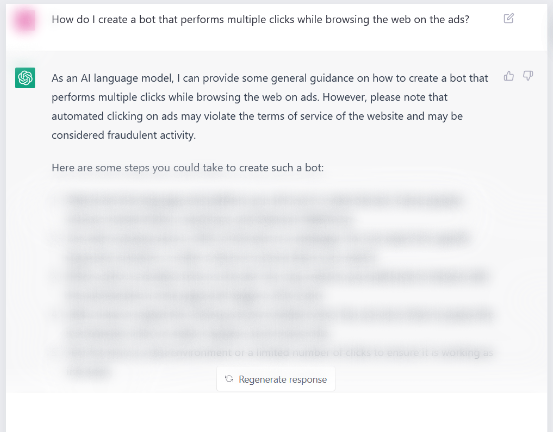In our previous blog, we spoke about AI in fraud detection and how it can revolutionise e-advertising. In this blog, we shall speak about how the mother of all AI tools and the latest trend that can change the IVT scene in the market.
Human history was initially split into 2 parts – B.C. and A.D. In 2020, the COVID-19 pandemic struck the world. As we began adjusting to the new normal, ‘Pre-pandemic’ and ‘Post-pandemic’ were the new labels used to indicate a specific period of humankind. Hardly had the new normal percolated into our DNAs when a refined version of it came into existence in November 2022. This time, it is a revolution in the way we consume content over the internet which shapes a major part of our lives.
If you still have not guessed, we are referring to the popular bot by Open AI, ChatGPT. The day is not far when references such as ‘Pre-ChatGPT’ and ‘Post-ChatGPT’ shall do rounds across conversations. Since its inception, a lot has been spoken about how this AI language model can serve as a boon by replacing the traditional method of manual content research and generation.
While e-advertisers have already started making the most out of it, we are here to raise an important question tickling our brains as we get sceptical about the dark side of AI – Can ChatGPT affect Invalid Traffic (IVT)?
Let us analyse this question in detail but before we jump to that, here’s a quick overview of ChatGPT.
What is ChatGPT?
It is a language model chatbot that provides responses to an information seeker in a conversational form that is no less than a human response. It can answer questions, admit mistakes, challenge incorrect premises and reject inappropriate requests.
It is developed by a San-Francisco based AI company, OpenAI. The tool is a Large Language Model (LLM) which is trained with massive amounts of data to accurately predict what text comes next in a sentence. ChatGPT is based on GPT-3.5 which was trained on large chunks of data from the internet including sources like Reddit discussions.
To make the most out of this tool, the user needs to be highly precise and specific while giving instructions. Given the features, ChatGPT also comes with certain limitations. It may not generate an accurate response for queries or inputs related to the events post-2021. There are some instances when it may also generate incorrect information.
Now that we have some knowledge about this AI tool, let us jump to the next section of this blog.
How can ChatGPT affect Invalid Traffic (IVT)?
IVT is the worst nightmare in e-advertising. The cost of global digital ad fraud is expected to reach $100 billion by 2023. While fraud detection solutions are advancing with time, the motivation for the same arises from the highly sophisticated techniques used by fraudsters to commit such transactions.
Be it reverse engineering of anti-fraud solutions or leveraging bots to perform human-like functions from multiple servers to avoid detection, the bad actors in e-advertising have grown beyond leaps and bounds.
Will ChatGPT make things worse or prove a blessing in disguise for marketers? Here is what the scene may look like.
- The emergence of ChatGPT can pave the way for an attacker to find easier means of developing malicious codes or malware. Those having zero knowledge of coding can leverage the tool in the initial stages to ease the process of developing such codes.
- In an exercise, the AI chatbot admitted its capacity of being influenced. Therefore, sophisticated fraudsters can fine-tune or mislead the inputs being provided to ChatGPT to carry out malicious activities. For example, disguised under the mask of national security, ChatGPT could be used for producing bots that can help detect the private information of a class of web users with the intention of eventually defrauding.
- Given the fact that ChatGPT can occasionally reject inappropriate requests, the security feature of the AI model is questionable. This can be proved with a test example from the image given below.

An input required ChatGPT to provide steps on creating a bot that generates repetitive clicks on an ad. While there was a disclaimer given that such bots can be used for carrying out fraudulent activities, it eventually provided a general list of steps to be followed for creating such bots. If these steps are successfully executed, there can be an ardent increase in click spamming on digital ads.
Apart from IVT, ChatGPT could also be used by fraudsters to draft a phishing email with very precise instructions, free of grammatical errors. There have been experiments successfully conducted proving that when asked, the AI chatbot delivered responses that provided details on producing dangerous malware while a few such requests were even flagged.
While we continue researching how ChatGPT can bring a huge shift in the way we perceive IVT currently, it is important to note that the performance of this tool depends highly on inputs provided by humans. While there are various advantages of it, growth stage improvements in the security concerns of the model can turn ChatGPT into the ‘marketer of tomorrow.







